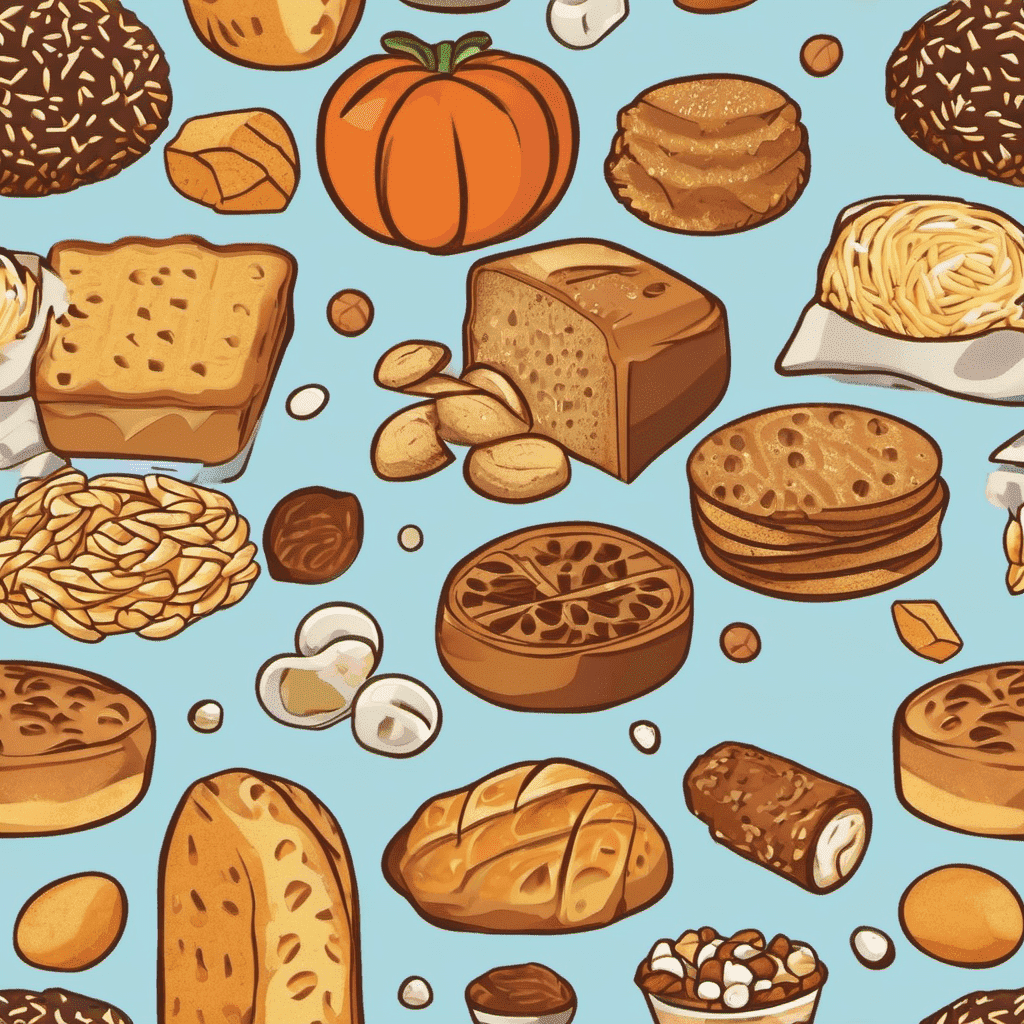Transform diabetes management with 5 ‘bad’ carbs: whole grains, legumes, sweet potatoes, fruits, and dark chocolate. Discover balanced and enjoyable eating.
Introduction:
Controlling diabetes involves making conscious and informed choices about dietary habits. Although traditionally, carbohydrates have been considered the enemy of diabetics, recent studies show that consuming certain “bad” carbohydrates can actually benefit people with diabetes. In this article, we explore five types of carbohydrates that, when consumed in moderation and with proper monitoring, can be incorporated into a diabetes-friendly diet.
Whole grains:
Whole grains play an important role for people with diabetes, challenging the traditional notion of avoiding carbohydrates. Adopting five specific “bad” carbohydrates, including whole grains, is essential to effectively managing diabetes. Unlike refined grains, whole grains are rich in fiber, vitamins, and minerals, which provide a slower release of glucose into the blood, thereby preventing a rapid rise in blood sugar levels. Complex carbohydrates found in whole grains contribute to sustained energy, better digestion, and better weight management, which are important for diabetes control. Including whole grains in the diet not only increases nutritional value, but also helps stabilize blood sugar levels, making them an essential part of a diabetes-friendly meal plan.
| Nutrient | Amount per 100g |
|---|---|
| Calories | 340 kcal |
| Total Fat | 2 g |
| Saturated Fat | 0.5 g |
| Trans Fat | 0 g |
| Cholesterol | 0 mg |
| Sodium | 5 mg |
| Total Carbohydrates | 73 g |
| Dietary Fiber | 10 g |
| Sugars | 0.5 g |
| Protein | 12 g |
| Vitamin A | 0 IU |
| Vitamin C | 0 mg |
| Calcium | 35 mg |
| Iron | 4 mg |
| Magnesium | 160 mg |
| Phosphorus | 350 mg |
| Potassium | 350 mg |
| Zinc | 3 mg |
Legumes:
Beans are especially important for people managing diabetes, offering a number of health benefits that contribute to overall well-being. These nutrient-dense foods, including beans, lentils, and chickpeas, are rich in complex carbohydrates, fiber, and protein. The complex carbohydrates in beans have a gradual effect on blood sugar levels, preventing spikes and promoting stable glucose metabolism. Additionally, the high fiber content in fruits helps control blood sugar by reducing sugar absorption and improving insulin sensitivity. This unique combination of nutrients not only helps in diabetes management but also helps in weight management, which is an important aspect for diabetics to maintain a healthy lifestyle.
Additionally, the protein content of fruits is important for diabetics as it contributes to satiety and helps regulate appetite. This can be especially beneficial for weight control, which is an important factor in diabetes management. Additionally, legumes have a low glycemic index, meaning they have minimal impact on blood sugar levels. This makes them a valuable food choice for people with diabetes, providing a stable source of energy without rapid fluctuations in blood glucose. Adding legumes to the diet offers many options for creating varied and flavorful meals, making it easier for people with diabetes to follow a balanced and satisfying nutrition plan. Overall, adding beans to a diabetic’s diet is a wise choice, leading to better blood sugar control, increased motivation, and improved overall health.
Sweet potatoes:
Sweet potatoes have emerged as a nutritional powerhouse for individuals managing diabetes, providing many benefits that support overall health and blood sugar control. Despite their sweet taste, sweet potatoes have a lower glycemic index than regular potatoes, which slows the absorption of glucose into the blood. This gradual effect helps prevent sudden spikes in blood sugar levels, making sweet potatoes a good choice for diabetics. What’s more, sweet potatoes are rich in fiber, especially soluble fiber, which helps slow digestion and reduce sugar absorption. This fiber content helps improve insulin sensitivity, promoting better blood sugar regulation.
Additionally, sweet potatoes are rich in essential nutrients including vitamins A and C, potassium and antioxidants. These nutrients play an important role in the overall well-being of people with diabetes. For example, vitamin A is essential for eye health, which is often associated with diabetes. Meanwhile, the high fiber content contributes to satiety, helping with weight management – an important aspect of diabetes control. The versatility of sweet potatoes allows for a variety of culinary preparations, from savory to sweet dishes, making it easy for people with diabetes to incorporate this nutrient-dense food into their balanced and enjoyable diet. Overall, adding sweet potatoes to a diabetic’s diet provides a tasty and health-promoting option that is compatible with effective blood sugar management.
Fruits:
While some fruits are high in sugar, certain options can be included in a diabetes-friendly diet. Berries, such as blueberries, strawberries, and raspberries, are rich in antioxidants and relatively low in carbohydrates. Portion control is key, ensuring that overall carbohydrate intake is tailored to individual dietary needs.
Fruits are important for people managing diabetes, offering a variety of essential nutrients and health benefits. While fruits contain natural sugars, they also provide fiber, vitamins, minerals and antioxidants, making them a valuable part of a balanced diet for people with diabetes. The fiber content of fruits, especially soluble fiber, plays an important role in reducing sugar absorption and improving blood sugar control. This slow release of sugar helps prevent rapid increases in blood glucose levels, helping overall glycemic control.
Additionally, the vitamins and antioxidants found in fruits, such as vitamin C and various phytochemicals, support the immune system and protect against oxidative stress. For people with diabetes, maintaining a strong immune system is very important, as they may be more susceptible to infections. A diverse range of fruits allows for a variety of choices, offering options with different glycemic indexes. For example, berries are low in sugar and high in fiber, making them particularly suitable for diabetics. While portion control is important, adding moderate amounts of fruit to the diet can increase the overall nutritional profile, help with satiety, and add a delightful variety of flavors and textures to foods. can Overall, when chosen wisely and eaten in moderation, fruits play an important role in the health and well-being of people with diabetes.
Dark Chocolate:
Dark chocolate, when eaten in moderation, may offer some health benefits for people with diabetes. It is important to choose dark chocolate that is high in cocoa and has minimal added sugar. Dark chocolate with at least 70 percent cocoa content or higher is best, as it has more cocoa solids and less sugar.
One of the main benefits of dark chocolate for diabetics is its lower glycemic index than milk chocolate. A low glycemic index means it has a milder effect on blood sugar levels, allowing for a slower and more controlled rise in glucose. This can be beneficial for people trying to effectively manage their blood sugar levels.
Dark chocolate is also rich in flavonoids, which are powerful antioxidants associated with various health benefits. Antioxidants help fight oxidative stress and inflammation, which are important concerns for people with diabetes because they are more susceptible to these problems. Additionally, some studies show that dark chocolate can have positive effects on cardiovascular health by improving blood flow and lowering blood pressure.
However, it is important to watch portion sizes when adding dark chocolate to a diabetic diet, as it is high in calories. Small amounts, such as one or two squares, can be a satisfying treat without significantly affecting blood sugar levels or calorie intake. It is advisable to consult a health care professional or registered dietitian to determine the appropriate amount based on individual health needs and dietary considerations.
In summary, dark chocolate with high cocoa content can form part of a balanced diet for people with diabetes, offering a treat that is not only enjoyable but also offers potential health benefits. Choosing quality dark chocolate, monitoring portion sizes, and considering individual health factors are essential to incorporating it into a diabetes-friendly eating plan.
Conclusion:
Finally, the recommendation to adopt five apparently “bad” carbohydrates, particularly whole grains,Legumes, sweet potatoes, fruit, and dark chocolate, represents an important and innovative approach to diabetes management. Contrary to conventional beliefs that often disparage carbohydrates for people with diabetes, these specific carbohydrate sources stand out for their nutritional richness, fiber content, and overall positive effects on blood sugar control. Whole grains provide sustained energy and essential nutrients, beans offer a combination of fiber and protein that support satiety, sweet potatoes contribute low-glycemic impact and important nutrients, fruits provide essential vitamins and antioxidants. , and dark chocolate, both can bring happiness when chosen wisely. and potential health benefits. This approach recognizes the importance of quality and balance in food choices, encouraging a shift from a restrictive mindset to one that embraces nutritious, whole foods, not just better blood sugar management. Not only does it promote overall well-being for people with diabetes. As always, individual dietary needs should be considered, and consultation with a health care professional or registered dietitian is recommended to tailor these recommendations to specific health conditions and goals.
Remember, embracing “bad” carbs is all about embracing nutrient-dense, complex carbs that better regulate blood sugar. Moderation, tracking your responses, and a holistic approach to diabetes management are key to a healthy and balanced life.
FAQs about Embracing “Bad” Carbs for Diabetics:
Q: Aren’t all carbs bad for diabetics?
A: Not all carbs are created equal! While refined carbs spike blood sugar, high-fiber, complex carbs provide sustained energy and manage blood sugar levels more effectively.
Q: Aren’t these “bad” carbs just marketing hype?
A: Terms like “good” and “bad” can be misleading. It’s important to focus on the type and quality of carbs rather than demonizing entire groups.
Q: Which five “bad” carbs should I consider embracing?
A: Examples include sweet potatoes, brown rice, whole-wheat bread, quinoa, and legumes like lentils and beans. These have high fiber and nutrient content, promoting slow digestion and minimizing blood sugar spikes.
Q: How much is safe to eat?
A: Moderation is key! Individual needs differ, so consult a doctor or registered dietitian for personalized recommendations. Focus on portion control and incorporating these carbs within a balanced diet.
Q: Won’t these carbs still raise my blood sugar?
A: Yes, they can, but to a lesser extent than refined carbs. The fiber content delays absorption and prevents sharp spikes. Pairing them with protein and healthy fats further slows down digestion.
Q: Is it okay to stop monitoring my blood sugar?
Absolutely not! Always monitor your blood sugar regardless of dietary changes. Track your responses to different foods and make adjustments as needed.
Q: What other steps can I take to manage diabetes?
A: Combine smart carb choices with regular exercise, stress management, and weight management. Aim for a healthy lifestyle approach, not just restrictive dieting.
Q: Are there any resources that can help me?
A: Consult your doctor for personalized guidance. Additionally, organizations like the American Diabetes Association offer valuable resources and support.
Q: Can’t I just avoid carbs altogether?
A: While low-carb diets can be effective for some, eliminating carbs isn’t always necessary or sustainable. Consult a healthcare professional to determine the best approach for your individual needs.








